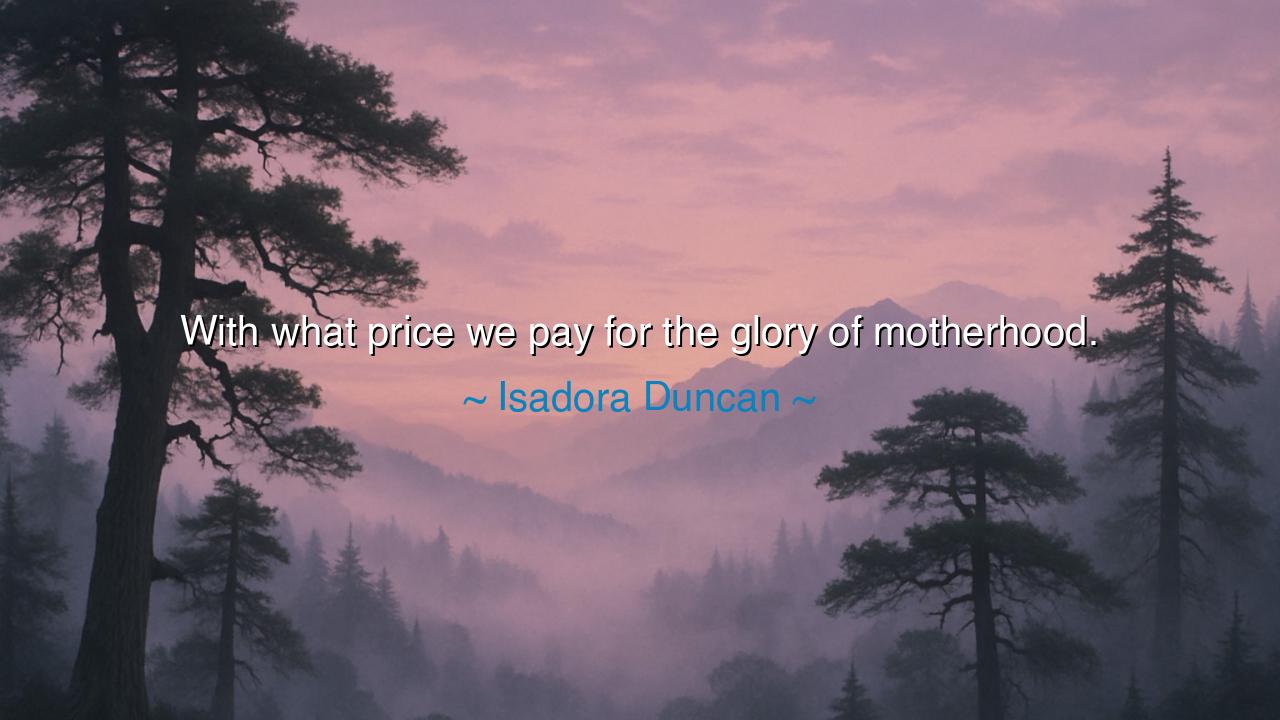
With what price we pay for the glory of motherhood.






Hear the lament, yet also the hymn, of Isadora Duncan: “With what price we pay for the glory of motherhood.” These words are steeped in both sorrow and reverence. They are not uttered lightly, for they arise from a woman whose own life bore the unbearable weight of maternal grief. Duncan, the great dancer of freedom, who moved as though the earth itself surged through her, lost her beloved children in a tragic accident. In her words, we hear both the exaltation of motherhood as the highest calling, and the mourning cry for the sacrifices and wounds that attend it.
The ancients themselves recognized this duality. To give life was the most sacred of acts, yet it was never without cost. Women were revered as the bearers of the future, yet often they bore the burden of risk, pain, and sacrifice. The goddess Demeter, in Greek myth, is not remembered only for her fertility, but for her grief when her daughter Persephone was taken from her. So too does Duncan’s cry echo this eternal truth: that the glory of motherhood is interwoven with suffering, and that its splendor cannot be separated from its price.
The price she speaks of is not only the physical pain of childbirth, though that is immense. It is also the daily surrender of self for another, the endless vigilance of love, the vulnerability of having one’s heart walk about in the fragile form of a child. Mothers bear the anxiety of illness, the ache of separation, the sorrow of loss. And yet, they endure it all because the glory—the joy of nurturing, of seeing life flourish from their own body and soul—is greater than all pain. It is the paradox of motherhood: suffering embraced for the sake of love.
History gives us radiant and tragic examples of this truth. Consider Mary, the mother of Christ, who bore her son with hope only to watch him crucified before her eyes. The glory of raising him, of shaping one who brought salvation to millions, was bound up with the unbearable cost of watching him suffer. Or reflect on the story of Empress Maria Theresa of Austria, who bore sixteen children, ruling an empire while facing the anguish of losing many of them to illness. Both women, though worlds apart, illustrate Duncan’s cry: the glory of motherhood shines brightest when weighed against the shadow of its cost.
The meaning of Duncan’s words is not to discourage, but to honor. She reminds us that motherhood is not a trivial role, not a mere biological fact—it is a heroic undertaking, a path of sacrifice that demands reverence. Society often praises warriors for their courage, yet mothers, in their quiet endurance, embody a courage no less noble. To bring forth life, to nurture it, to risk the breaking of one’s heart for its flourishing—this is a glory that surpasses crowns and armies. But it is a glory bought at a great price.
The lesson we must carry is to never forget the cost borne by those who mother us, whether by blood or by spirit. Too often their sacrifices are hidden, their pain overlooked, their burdens dismissed. To honor mothers is not only to praise their love but to acknowledge the struggles entwined with it—the sleepless nights, the tears shed in silence, the dreams set aside so that others might live theirs. Gratitude must be more than words; it must be shown in care, respect, and support.
Practically, this means lifting some of the weight from their shoulders. It means giving back in small ways: by offering help, by speaking appreciation, by honoring their humanity beyond the role they play. It means creating societies that do not glorify motherhood only in poetry, but in action—by providing care, dignity, and rest to those who give so much. In our own lives, it means remembering daily that our existence itself was purchased by the sacrifice of another.
Thus let Duncan’s cry endure across generations: “With what price we pay for the glory of motherhood.” It is both lament and praise, grief and gratitude. It teaches us that love in its highest form is costly, and that the crown of motherhood is woven with both roses and thorns. May we learn from this truth to hold mothers in reverence, to honor their sacrifices, and to live in such a way that their price was not paid in vain.






AAdministratorAdministrator
Welcome, honored guests. Please leave a comment, we will respond soon